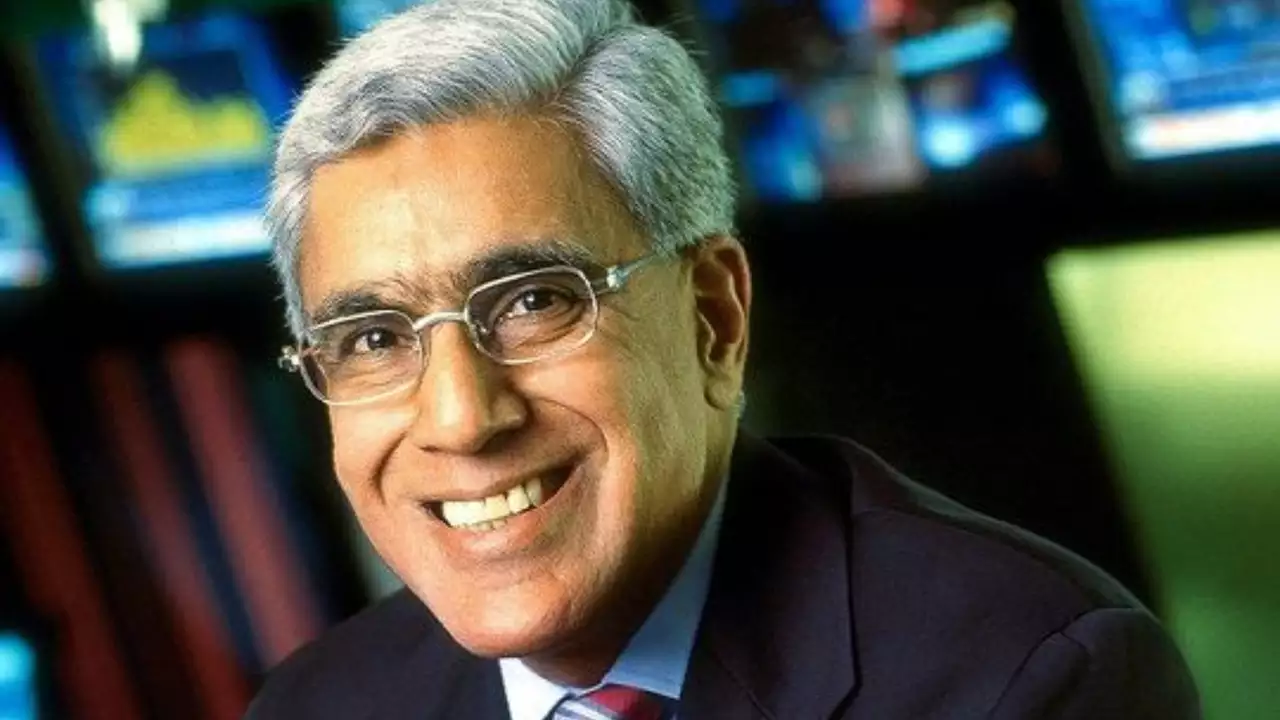News Anchor
Karan Thapar Wiki, Early life, Awards, Net Worth, Lifestyle, Relationship and more

Early Life:
Karan Thapar was born on November 5, 1955, in Srinagar, Jammu and Kashmir, India. He hails from a distinguished family background, with his father, General Pran Nath Thapar, being a decorated army officer and his mother, Bimla Thapar, a renowned columnist and social activist. Thapar spent his formative years in various cities due to his father’s postings in the Indian Army.
Education:
Thapar pursued his education at The Doon School in Dehradun before attending Pembroke College, Cambridge, where he studied English Literature. He later obtained a Master’s degree in International Relations from the University of Pennsylvania, United States.
Career Beginnings:
Thapar began his career in journalism in the early 1980s, working as a correspondent for The Times, London. He later returned to India and joined The Hindustan Times, where he served as the Editor of the Sunday magazine.
Rise to Prominence:
Thapar’s rise to prominence came when he joined the Indian television network, Doordarshan, as a news anchor and presenter. His incisive interviewing style and insightful analysis quickly made him one of the most recognizable faces on Indian television.
Journalism and Activism:
Throughout his career, Thapar has been a vocal advocate for press freedom, democratic values, and social justice. He has used his platform as a journalist to raise awareness about pressing social and political issues and to hold those in power accountable.
Awards and Recognitions:
Thapar’s contributions to journalism have been widely recognized and honored. He has received several prestigious awards, including the Ramnath Goenka Excellence in Journalism Award and the Padma Shri, one of India’s highest civilian honors, for his exceptional contributions to the field of journalism.
Personal Life:
Karan Thapar keeps his personal life private, and information about his family life and relationships is not widely available. He is known for his dedication to his work and his passion for journalism.
Less Known Facts:
- Family Legacy: Thapar comes from a family with a rich legacy in Indian history and politics. His maternal grandfather, General P.N. Thapar, was the Chief of Army Staff during the Indo-Pakistani War of 1965, and his aunt, Romila Thapar, is a prominent historian and scholar.
- Political Connections: Thapar has close ties to various political figures and leaders across party lines. His ability to maintain relationships with politicians from diverse backgrounds has often provided him with unique insights and perspectives in his interviews and analysis.
- Literary Pursuits: In addition to his work in journalism, Thapar is also an author and has written several books on Indian politics and history. His writings reflect his deep understanding of Indian society and politics, offering readers valuable insights into contemporary issues.
- Interviewing Style: Thapar is known for his confrontational interviewing style, where he poses tough questions and challenges his guests’ responses. His interviews are characterized by their intensity and rigor, making them must-watch events for viewers.
- International Recognition: Thapar’s work as a journalist has earned him international recognition and acclaim. He has been invited to speak at various international forums and conferences, where he shares his insights on Indian politics and current affairs.
FAQs:
1. How did Karan Thapar become a journalist?
Thapar’s interest in journalism was sparked by his exposure to diverse cultures and experiences during his upbringing. He pursued a career in journalism after completing his education, starting as a correspondent for The Times, London, before returning to India to work in television journalism.
2. What are some of Karan Thapar’s most notable interviews?
Thapar’s interviews with political figures such as Narendra Modi, Sonia Gandhi, and Imran Khan are among his most notable. His incisive questioning and ability to elicit candid responses have made his interviews memorable and impactful.
3. How does Karan Thapar prepare for his interviews?
Thapar is known for his meticulous preparation before interviews, conducting extensive research on his guests and the topics at hand. He formulates probing questions based on his research, ensuring that his interviews are insightful and informative.
4. What role does Karan Thapar envision for journalism in shaping public opinion?
Thapar believes that journalism plays a crucial role in shaping public opinion and holding those in power accountable. He advocates for ethical and responsible journalism that provides citizens with accurate information and diverse perspectives on critical issues.
5. How does Karan Thapar handle criticism of his interviewing style?
Thapar approaches criticism of his interviewing style with professionalism and integrity, acknowledging differing viewpoints while defending the importance of rigorous questioning in journalism. He believes in the value of holding power to account through challenging interviews.
Controversies:
- Allegations of Bias: Thapar has faced allegations of bias in his interviews, with critics accusing him of favoring certain political parties or ideologies. These allegations have raised questions about his objectivity as a journalist.
- Exit from CNN-IBN: Thapar’s departure from CNN-IBN, where he hosted the popular interview show “Devil’s Advocate,” sparked speculation and rumors about the reasons behind his exit. Some speculated that it was due to disagreements over editorial direction or management issues.
- Accusations of Sensationalism: Thapar has been accused of sensationalism in his interviews, with critics arguing that he prioritizes controversy and confrontation over substantive discussion. These accusations have led to debates about the role of sensationalism in journalism.
- Controversial Interviews: Thapar’s interviews with political figures have occasionally sparked controversy due to their confrontational nature. Critics have accused him of being overly aggressive or disrespectful towards his guests, leading to debates about journalistic ethics.
- Allegations of Unprofessionalism: Thapar has faced allegations of unprofessionalism in his interactions with guests and colleagues, with some accusing him of being rude or dismissive. These allegations have raised questions about his conduct as a journalist.
| Attribute | Details |
|---|---|
| Full Name | Karan Thapar |
| Nickname | N/A |
| Nationality | Indian |
| Zodiac/Sun Sign | Scorpio |
| Birthplace | Srinagar, Jammu and Kashmir, India |
| Current Address | N/A |
| Parent’s Name | Pran Thapar (Father) |
| Bimla Thapar (Mother) | |
| Siblings | N/A |
| Wife or GF or Husband | N/A |
| Children | N/A |
| School | The Doon School, Dehradun |
| Awards | Padma Shri (2008) from the Government of India |
| International Broadcasters Award (2003) | |
| Alma Mater | Pembroke College, Cambridge |
| Highest Qualification | Master’s in Economics |
| Net Worth | N/A |
| Hobbies | Reading, Traveling, Debating |
| Height | N/A |
| Weight | N/A |
| To the Point (@KaranThapar_TTP) | |
| N/A | |
| N/A |
Conclusion:
In conclusion, Karan Thapar is a distinguished journalist and television presenter whose contributions to Indian journalism have been significant and impactful. From his early days as a correspondent to his current role as a prominent interviewer, Thapar has demonstrated a commitment to journalistic integrity and excellence. Despite facing controversies and challenges throughout his career, he has remained steadfast in his pursuit of truth and accountability, using his platform to inform and engage with the masses. As he continues to inspire and influence the next generation of journalists, Thapar’s legacy will endure as a testament to the enduring power of journalism in shaping public discourse and promoting democratic values.
